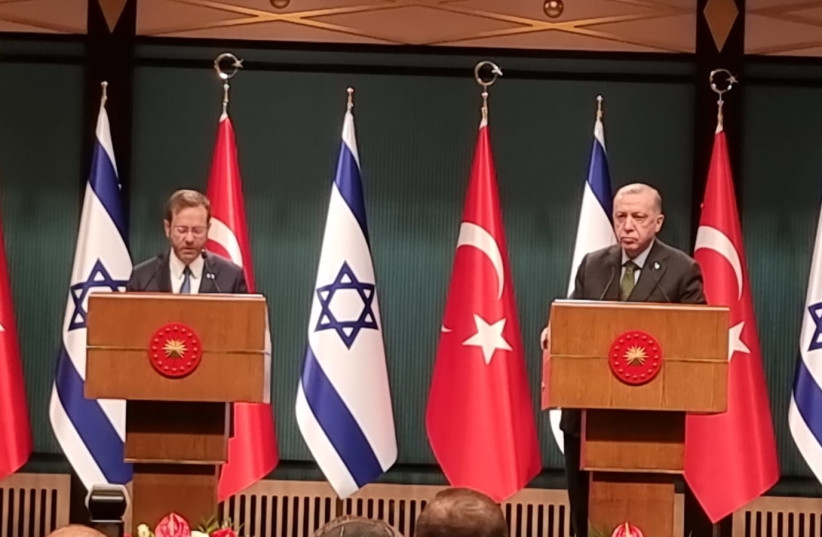In the wake of the iconic visit of Israel’s President Isaac Herzog to Turkey, there is a feeling that Ankara and Jerusalem might suddenly be back on track in foreign ties.
This comes a decade after the ties disintegrated due to Turkey’s President Recep Tayyip Erdogan’s far-right AKP Party and its support of Hamas, as well as its extreme anti-Israel rhetoric. The photos of the Israeli presidential visit certainly are symbolic and important. A new era could emerge.
This hinges on Turkey’s actions in the coming months and years. Will it put away the negative rhetoric of the past and actually change, or was the visit just to curry favor with Washington and receive investments? Can Turkey change its policies?
First we need to remember what Turkey did.
Ties with Israel fell apart not because of Jerusalem, which wanted warm relations, but solely because of Ankara’s actions. From Turkey’s perspective, this was necessary because Israel was continuing its policies of blockading Gaza and not being nice to Hamas.

Turkey’s ruling AKP Party is rooted in the Muslim Brotherhood. Hamas is also rooted in the same ideological far-right political-religious tradition. Turkey had backed not only Hamas but also the Brotherhood in Egypt, and together they worked with Qatar. However, the Brotherhood in Egypt was thrown out of power in 2013.
Relations fell apart also due to Turkey’s anger over Operation Cast Lead and a belief that Israel’s prime minister, Ehud Olmert, wasn’t being open with Ankara about his policies.
Relations got worse when hundreds of Turkish far-right IHH activists boarded the Mavi Marmara and set off for Gaza. Israel intercepted the flotilla, Turkish activists attacked Israeli soldiers, and nine Turkish citizens were killed. Turkey was angry, but there were attempts to “reboot” relations when prime minister Benjamin Netanyahu was in charge. Nevertheless, those attempts in 2015 and 2016 came to naught.
When Donald Trump became US president, Turkey believed it had won the lottery because there were pro-Ankara voices around Trump. Turkey was told it had a blank check to do what it wanted, especially in Syria.
Soon Ankara was on the rampage. It threatened Greece and Cyprus; signed a deal with Libya; threatened Egypt, Saudi Arabia and the UAE; worked closely with Iran and Russia; and attacked US Kurdish allies. Turkey even began to threaten US troops in Syria, telling Trump to withdraw from Syria so Turkey could ethnically cleanse Kurds.
ALL OF THIS took place amid increasing anti-Israel and antisemitic rhetoric in Ankara. Erdogan compared Israel to Nazi Germany, in his speech at the UN in 2019. Turkey twice hosted Hamas terrorist leaders for high-level meetings, and reports said Hamas was planning terrorist attacks from Turkey.
This red carpet for Hamas was even too much for the Trump administration, as was Turkey buying Russia’s S-400 surface-to-air system. Turkey wasn’t done yet, though. It tried to stop the Abraham Accords and the US Embassy moving to Jerusalem. But then its anti-Israel agenda – from probably one of the most anti-Israel governments in the world except for Iran – ran out of steam.
With the election of Joe Biden, Turkey had lost a friend in the White House and it turned to reconciliation. It reached out to the United Arab Emirates, Egypt and other countries. Having fueled wars in Libya, Syria, Iraq and against Armenia, and almost coming to blows with Greece and Cyprus, it suddenly changed tack. Now it wanted to work with Israel and floated various ideas. Turkey’s goal was partly to get Israel away from Greece by sabotaging an East Med pipeline.
Now pro-Turkey media is singing the praises of relations between Jerusalem and Ankara.
“Israel and Turkey have announced a new era in relations following more than a decade of diplomatic rupture, as Israeli President Isaac Herzog made a landmark visit to the Turkish capital, Ankara,” Al Jazeera said.
Turkey’s pro-government media, and its state media such as TRT, Daily Sabah and others, have highlighted the Israeli visit. But they also point out this won’t be at the expense of the Palestinians. They want the region to know Turkey is still championing the Palestinian cause.
Turkey rides this cause the way Iran does. It doesn’t really care about Palestinians, but it wants influence. That is why Ankara has previously claimed it will “liberate” Jerusalem, and has linked “liberating” al-Aqsa Mosque to its changing the former Hagia Sophia Church in Istanbul into a mosque.
For Turkey, the Palestinian cause is like Kashmir – it is part of the global Islamist causes Ankara backs. Along with Qatar, this is Turkey’s main policy. But Turkey’s economy is a wreck, and it wants investment from Israel and the UAE. So it is playing nice. But will it go beyond economic talk and actually shift its policies? Time will tell.
Media headlines in Ankara will also tell. It wasn’t long ago that Ankara’s pro-government media was spreading conspiracies about the number of Jewish members of Biden’s cabinet, or pushing antisemitic conspiracies that date from the early 20th century. Can Ankara end the addiction to anti-Israel and anti-Jewish rhetoric? For now the symbols of reconciliation have been unfurled. But it’s a matter of making them a reality. Ten years of sour relations are still in the air.
